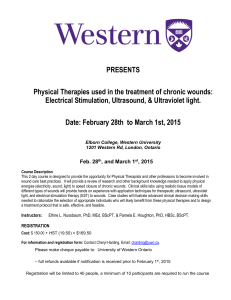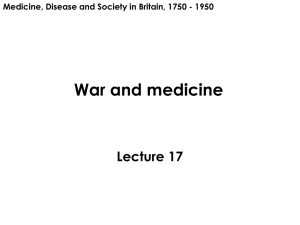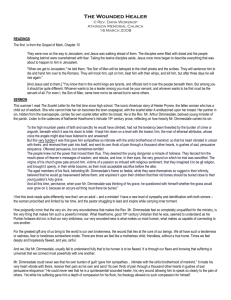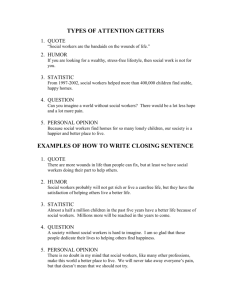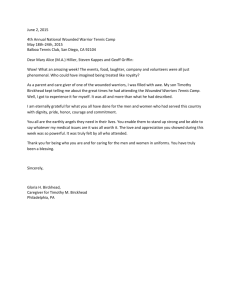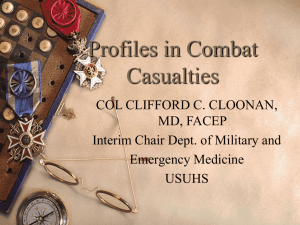From: Henry Dunant, A Memory of Solferino (1862) I was a mere
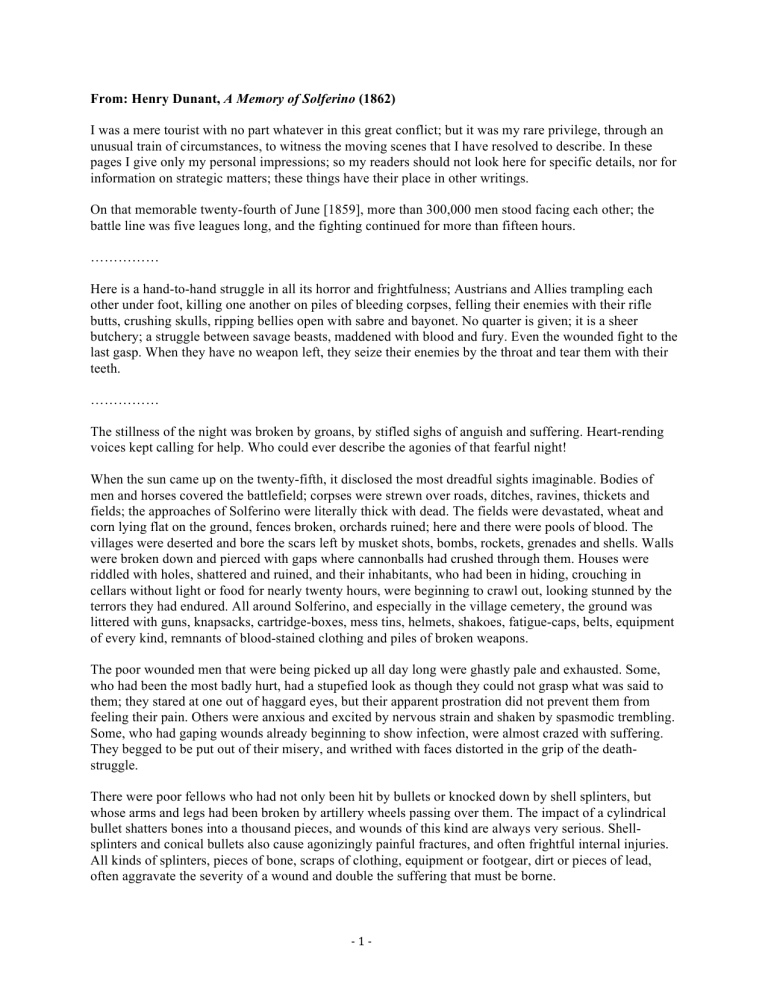
From: Henry Dunant, A Memory of Solferino (1862)
I was a mere tourist with no part whatever in this great conflict; but it was my rare privilege, through an unusual train of circumstances, to witness the moving scenes that I have resolved to describe. In these pages I give only my personal impressions; so my readers should not look here for specific details, nor for information on strategic matters; these things have their place in other writings.
On that memorable twenty-fourth of June [1859], more than 300,000 men stood facing each other; the battle line was five leagues long, and the fighting continued for more than fifteen hours.
……………
Here is a hand-to-hand struggle in all its horror and frightfulness; Austrians and Allies trampling each other under foot, killing one another on piles of bleeding corpses, felling their enemies with their rifle butts, crushing skulls, ripping bellies open with sabre and bayonet. No quarter is given; it is a sheer butchery; a struggle between savage beasts, maddened with blood and fury. Even the wounded fight to the last gasp. When they have no weapon left, they seize their enemies by the throat and tear them with their teeth.
……………
The stillness of the night was broken by groans, by stifled sighs of anguish and suffering. Heart-rending voices kept calling for help. Who could ever describe the agonies of that fearful night!
When the sun came up on the twenty-fifth, it disclosed the most dreadful sights imaginable. Bodies of men and horses covered the battlefield; corpses were strewn over roads, ditches, ravines, thickets and fields; the approaches of Solferino were literally thick with dead. The fields were devastated, wheat and corn lying flat on the ground, fences broken, orchards ruined; here and there were pools of blood. The villages were deserted and bore the scars left by musket shots, bombs, rockets, grenades and shells. Walls were broken down and pierced with gaps where cannonballs had crushed through them. Houses were riddled with holes, shattered and ruined, and their inhabitants, who had been in hiding, crouching in cellars without light or food for nearly twenty hours, were beginning to crawl out, looking stunned by the terrors they had endured. All around Solferino, and especially in the village cemetery, the ground was littered with guns, knapsacks, cartridge-boxes, mess tins, helmets, shakoes, fatigue-caps, belts, equipment of every kind, remnants of blood-stained clothing and piles of broken weapons.
The poor wounded men that were being picked up all day long were ghastly pale and exhausted. Some, who had been the most badly hurt, had a stupefied look as though they could not grasp what was said to them; they stared at one out of haggard eyes, but their apparent prostration did not prevent them from feeling their pain. Others were anxious and excited by nervous strain and shaken by spasmodic trembling.
Some, who had gaping wounds already beginning to show infection, were almost crazed with suffering.
They begged to be put out of their misery, and writhed with faces distorted in the grip of the deathstruggle.
There were poor fellows who had not only been hit by bullets or knocked down by shell splinters, but whose arms and legs had been broken by artillery wheels passing over them. The impact of a cylindrical bullet shatters bones into a thousand pieces, and wounds of this kind are always very serious. Shellsplinters and conical bullets also cause agonizingly painful fractures, and often frightful internal injuries.
All kinds of splinters, pieces of bone, scraps of clothing, equipment or footgear, dirt or pieces of lead, often aggravate the severity of a wound and double the suffering that must be borne.
‐ 1 ‐
……………
The lack of water was more and more cruelly felt; the ditches were drying up, and the soldiers had for the most part only polluted and brackish water to quench their thirst. Wherever springs had been found, armed sentries were posted to keep the water for the sick. Near Cavriana, a swamp that had become foul served for two days to water twenty thousand artillery and cavalry horses. Some wounded, riderless beasts, after wandering all night long, dragged themselves towards the horselines as if asking their fellows for help, and were shot to put them out of their misery.
……………
It took three days and three nights to bury the dead on the battlefield, but in such a wide area many bodies which lay hidden in ditches, in trenches, or concealed under bushes or mounds of earth, were found only much later; they, and the dead horses, gave forth a fearful stench.
……………
Oh, the agony and suffering during those days, the twenty-fifth, twenty-sixth and twenty-seventh of June!
Wounds were infected by the heat and dust, by shortage of water and lack of proper care, and grew more and more painful. Foul exhalations contaminated the air, in spite of the praiseworthy attempts of the authorities to keep hospital areas in a sanitary condition. The convoys brought a fresh contingent of wounded men into Castiglione every quarter of an hour, and the shortage of assistants, orderlies and helpers was cruelly felt. In spite of the activity of one army doctor and two or three other persons in organizing transportation to Brescia by oxcart, and in spite of the spontaneous help given by carriageowners in Brescia, who came to fetch officer patients with their carriages, cases could not be evacuated nearly as quickly as new ones came in, and the congestion grew worse and worse.
Men of all nations lay side by side on the flagstone floors of the churches of Castiglione-Frenchmen and
Arabs, Germans and Slavs. Ranged for the time being close together inside the chapels, they no longer had the strength to move, or if they had there was no room for them to do so. Oaths, curses and cries such as no words can describe resounded from the vaulting of the sacred buildings.
"Oh, Sir, l'm in such pain!" several of these poor fellows said to me, "they desert us, leave us to die miserably, and yet we fought so hard!" They could get no rest, although they were tired out and had not slept for nights. They called out in their distress for a doctor, and writhed in desperate convulsions that ended in tetanus and death. Some of the soldiers got the idea that cold water poured on already festering wounds caused worms to appear, and for this absurd reason they refused to allow their bandages to be moistened. Others, who were fortunate enough to have had their wounds dressed at once in field hospitals, received no fresh dressings at Castiglione during their enforced stay there; the tight bandages that had been put on to help them to stand the jolts of the road having been neither replaced nor loosened, these men were undergoing perfect tortures.
With faces black with the flies that swarmed about their wounds, men gazed around them, wild-eyed and helpless. Others were no more than a worm-ridden, inextricable compound of coat and shirt and flesh and blood. Many were shuddering at the thought of being devoured by the worms, which they thought they could see coming out of their bodies (whereas they really came from the myriads of flies which infested the air). There was one poor man, completely disfigured, with a broken jaw and his swollen tongue hanging out of his mouth. He was tossing and trying to get up. I moistened his dry lips and hardened tongue, took a handful of lint and dipped it in the bucket they were carrying behind me, and squeezed the water from this improvised sponge into the deformed opening that had been his mouth. Another wretched
‐ 2 ‐
man had had a part of his face-nose, lips and chin-taken off by a sabre cut. He could not speak, and lay, half-blind, making heart-rending signs with his hands and uttering guttural sounds to attract attention. I gave him a drink and poured a little fresh water on his bleeding face. A third, with his skull gaping wide open, was dying, spitting out his brains on the stone floor. His companions in suffering kicked him out of their way, as he blocked the passage. I was able to shelter him for the last moments of his life, and I laid a handkerchief over his poor head, which still just moved.
Although every house had become an infirmary, and each household had plenty to do in taking care of the wounded officers within its doors, I succeeded, by the Sunday morning, in getting together a certain number of women who helped as best they could with the efforts made to aid the wounded. It was not a matter of amputations or operations of any kind. But food, and above all drink, had to be taken around to men dying of hunger and thirst; then their wounds could be dressed and their bleeding, muddy, vermincovered bodies washed; all this in a scorching, filthy atmosphere in the midst of vile, nauseating odours, with lamentations and cries of anguish all around!
Before long a group of volunteer helpers was formed. The Lombard women went first to those who cried the loudest-not always the worst cases. I sought to organize as best I could relief in the quarters where it seemed to be most lacking, and I adopted in particular one of the Castiglione churches, on a height on the left coming from Brescia, and called, I think, the Chiesa Maggiore. Nearly five hundred soldiers were there, piled in the church, and a hundred more lay outside on straw in front of the church, with strips of canvas to protect them from the sun. The women entered the churches, and went from one man to another with jars and canteens full of pure water to quench their thirst and moisten their wounds. Some of these improvised nurses were beautiful and charming girls. Their gentleness and kindness, their tearful and compassionate looks, and their attentive care helped revive a little courage among the patients. The boys of the neighbourhood ran back and forth between the churches and the nearest fountains with buckets, canteens and watering pots.
……………
But why have I told of all these scenes of pain and distress, and perhaps aroused painful emotions in my readers? Why have I lingered with seeming complacency over lamentable pictures, tracing their details with what may appear desperate fidelity?
It is a natural question. Perhaps I might answer it by another:
Would it not be possible, in time of peace and quiet, to form relief societies for the purpose of having care given to the wounded in wartime by zealous, devoted and thoroughly qualified volunteers?
……………
Societies of this kind, once formed and their permanent existence assured, would naturally remain inactive in peacetime. But they would be always organized and ready for the possibility of war. They would have not only to secure the goodwill of the authorities of the countries in which they had been formed, but also, in case of war, to solicit from the rulers of the belligerent states authorization and facilities enabling them to do effective work.
Source: http://www.icrc.org
‐ 3 ‐
